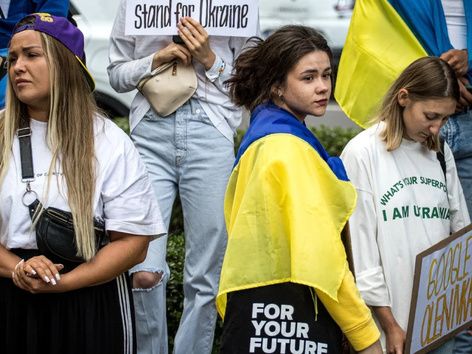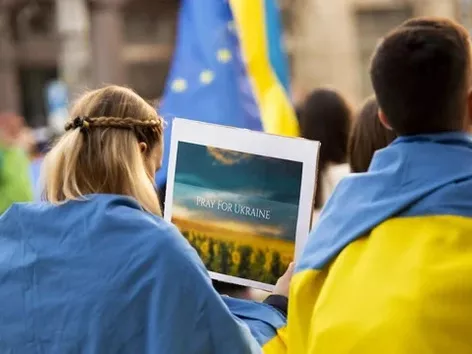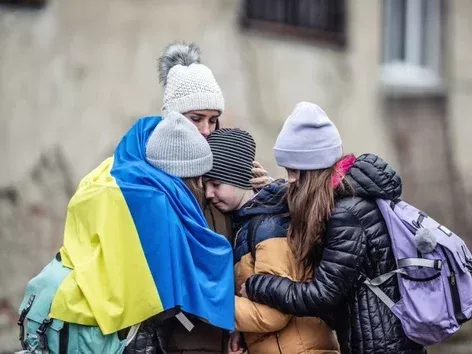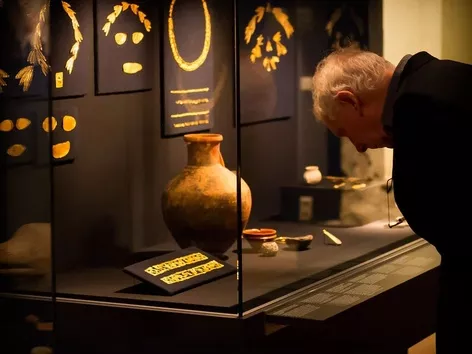
russian authorities use propaganda not only on the battlefield. Learn about the 4 most common stereotypes designed to humiliate and discredit Ukrainians in the EU, which are actively promoted by russia
Recently, social media has seen an increase in shouts and stories about Ukrainians being uneducated, impudent and lazy. However, no statistics support the stereotypes about Ukrainian refugees and migrants that the russian authorities are so actively trying to promote. At the same time, we know how skillfully russia distorts facts and plays with people's minds, and therefore their attempts to divide Ukrainians and cause hostile attitudes among Europeans towards Ukrainian citizens are sometimes successful.
Let's figure out together what false stereotypes about Ukrainians in Europe have been entrenched in people's minds and refute them, explaining the real state of affairs.
Read about how the war changed the portrait of Ukrainians in Poland here.
Stereotype 1 - migrant workers
The use of the word "migrant workers" automatically reduces the concept of migration to the possibility of earning money, usually by being low-skilled and low-paid. It is worth noting that russia uses exactly the same derogatory and discrediting form of the concept of migration - "gastarbeiters".
Yes, we cannot deny the fact that in recent years, Ukrainians have become one of the largest groups of migrants in Europe, with only Turkish and Moroccan citizens outnumbering them. And according to statistics from 2021, residence permits were most often issued to Ukrainians on the basis of employment (57.3% of all issued permits). For comparison, only 20% of Ukrainian citizens applied for a permit for family reasons and 2.5% for education.
However, research and statistics show that labor migrants from Ukraine have a high level of adaptability and therefore very quickly begin to look for work in accordance with their qualifications and skills, which, accordingly, has a much higher level of wages. And even of those Ukrainians who were forced to leave for Poland due to the full-scale invasion of russia, one third changed their place of work within a year.
We wrote about whether Poles are ready to continue supporting Ukrainians here.
In addition, Ukrainians are actively opening their own businesses in Europe. In 2022 alone, 14 thousand companies with Ukrainian capital or owners were registered in Poland. Due to the war, the number of people willing to start their own business has decreased, but this is not surprising given the events.
It is also worth noting that, for example, in Poland, the number of Poles willing to work in Ukrainian companies and firms has increased unprecedentedly over the past 20 years, from 20% to 60-80%. This is confirmed by a study conducted by the Warsaw Institute of Public Affairs.
Thus, all of the above proves that the concept of "migrant workers" is not at all suitable for describing Ukrainian migrants in Europe. After all, Ukrainians are very adaptable and mobile in the European labor market, and they are not afraid to change jobs in search of better employment with a high level of income in line with their skills and specialization.
Stereotype 2 - lazy people
The russian propaganda machine was very active in promoting this stereotype in 2022. The main narrative was that Europe's economy would be "choked" by the flow of Ukrainian refugees, as it would be forced to feed and support millions of Ukrainian citizens on European taxes.
However, this stereotype was not justified either, as almost 80% of Ukrainians who were forced to leave for Europe found jobs. Moreover, Ukrainian citizens in Poland alone paid about $2.5 billion in taxes, which is significantly more than the amount of money allocated for the "maintenance of Ukrainian refugees."
It should be noted that Ukrainians not only temporarily live and work in the EU, but also continue to remotely help and support the Ukrainian army by donating to charities and directly participating in volunteer activities.
Visit Ukraine on social media: Telegram | YouTube | Instagram | Facebook | Twitter | TikTok
Stereotype 3 - uneducated
The falsity of this myth and the high level of education of Ukrainian citizens is eloquently confirmed by the following paradox: according to the study, 56% of Ukrainian refugees and migrants have higher or incomplete higher education, while the total share of people with higher education in the EU is only 33%.
At the same time, the success of Ukrainian children who have been forced to study in foreign schools for the past two years also dispels this stereotype. After all, the vast majority of teachers say that children from Ukraine who came here because of the war adapted very quickly and mastered the language. This is confirmed not only by the words of teachers, but also by high grades at school and prizes in various competitions.
Stereotype 4 - russian-speaking Ukrainians
The false origin of this stereotype is confirmed by the latest census data in Poland, as one of the questions in the survey concerned the language used by citizens in everyday life. Thus, 85% of Ukrainian migrants surveyed in Poland said that they speak Ukrainian at home.
It is also important that this census was conducted in 2021, i.e., before the outbreak of a full-scale war with russia and therefore before Ukrainians began to switch to Ukrainian en masse, abandoning the language of the aggressor country. Moreover, the census showed that Ukrainians are the only minority group in Poland that speaks their national language at home.
And the direct invasion of russia was the impetus for the popularization of Ukrainian culture and language abroad. Today, no one in Europe is surprised by cultural events designed to showcase Ukrainian art, cuisine or other national achievements to the world. Moreover, foreigners are actively interested in Ukraine and are eager to discover its culture and history.
So, despite russia's active efforts to discredit Ukrainians in Europe, we see that the real picture is completely opposite to the one promoted by russia. And paradoxically, the direct russian invasion has allowed Europeans to personally meet Ukrainian citizens on their territory and make sure that Ukrainians will never be on welfare and brazenly enjoy good attitudes and sincere help from partner countries.
We remind you that a large number of foreigners are still interested in employment in Ukraine. In our previous article, we talked about what foreigners need to find a job and get a job in Ukraine.
Photo: Unsplash
You may be interested in:
Visit Ukraine Donation - make a good deed and an important contribution to the Victory of Ukraine;
Visit Ukraine Tours - the largest online database of tours to Ukraine for every taste;
Visit Ukraine Merch - choose patriotic clothing and accessories with worldwide delivery;
Visit Ukraine News - get the latest news and updates in our Telegram channel;
Cooperation - cooperation and advertising integrations with Visit Ukraine and Visit World projects.
Recommended articles
3 min
Popular
Failed holiday season in Crimea: why beaches and hotels on the peninsula are empty
Some Crimean hotels have not even opened due to lack of bookings, and there are almost no people on the beaches. Find out more about what is happening in Crimea and why the holiday season on the peninsula has not started
19 Jun. 2023
More details2 min
Way to Victory
What are the attitudes of Ukrainians towards the Verkhovna Rada and the President: survey results
The government during martial law plays a crucial role in stabilizing the economic and political situation in the country. Find out how Ukrainians feel about the current Verkhovna Rada and the President of Ukraine and what percentage of the population wants to see changes after the victory
20 Jun. 2023
More details1 min
Popular
Refugee Day: How War Provoked One of Europe's Largest Migrations
Every year, on June 20, the world recognizes the courage and strength of people who have been forced to flee their home countries. Find out more about how the war in Ukraine has led to one of the largest migration waves
20 Jun. 2023
More details3 min
Culture
Why is Scythian gold important for the world's cultural heritage and Ukraine in particular?
On June 21, 1971, a unique royal jewelry, the Golden Pectoral, was found in the Scythian mound of Tolstaya Grave. Find out why the struggle for Scythian gold is still going on in the world and why the victory in court is important for Ukraine
21 Jun. 2023
More details

